Ukrainian President Volodymyr Zelensky has accused Russia of ‘complicating’ efforts to end the war by refusing a ceasefire as he prepares to meet Donald Trump.
Mr Zelensky will visit the White House tomorrow for a one-on-one which the US President believes could pave the way for a three-way meeting with Vladimir Putin.
The Russian and American leaders shook hands on Friday at a military base at Anchorage in Alaska for a superpower summit to broker an end to the war in Ukraine.
But Ukraine’s future as a sovereign nation is now hanging in the balance following the crunch talks, with critics warning other world leaders were powerless to prevent Mr Zelensky from being caught ‘with his head in a vice’ by Mr Trump and Mr Putin.
It comes as Prime Minister Sir Keir Starmer, French President Emmanuel Macron and German Chancellor Friedrich Merz will hold a ‘coalition of the willing’ meeting today.
President Zelensky wrote on X last night: ‘We see that Russia rebuffs numerous calls for a ceasefire and has not yet determined when it will stop the killing.
‘This complicates the situation. If they lack the will to carry out a simple order to stop the strikes, it may take a lot of effort to get Russia to have the will to implement far greater – peaceful coexistence with its neighbours for decades.
‘But together we are working for peace and security. Stopping the killing is a key element of stopping the war.’
He also said he was ‘grateful for the invitation’ from Mr Trump, and it was ‘important that everyone agrees there needs to be a conversation at the level of leaders to clarify all the details and determine which steps are necessary and will work’.
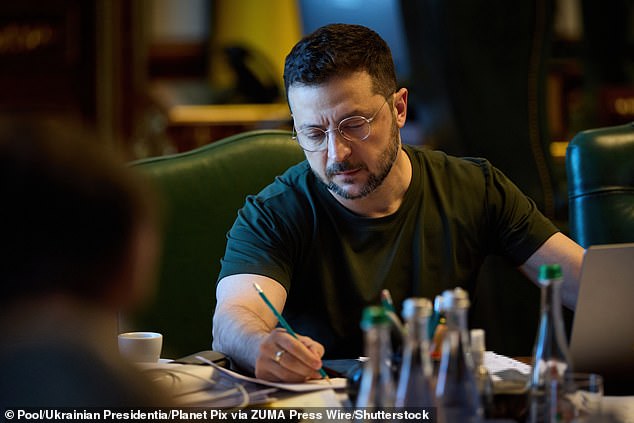
Ukrainian President Volodymyr Zelensky listens at the Mariinskyi Palace in Kiev yesterday during a conference call with Donald Trump and European partners after the Alaska summit
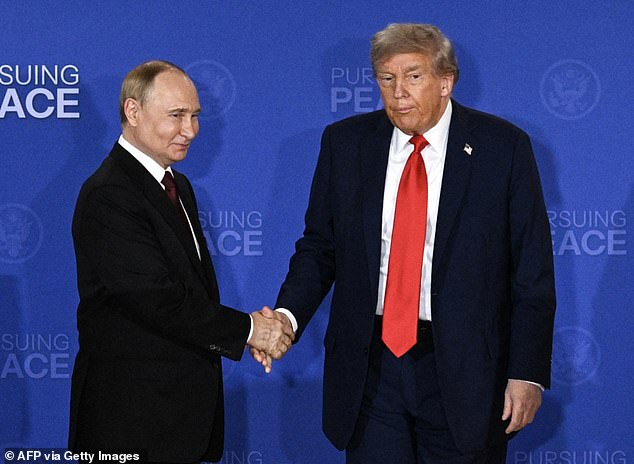
Donald Trump and Vladimir Putin shake hands after a joint press conference following the US-Russia summit on Ukraine at Joint Base Elmendorf-Richardson in Anchorage, Alaska, on Friday
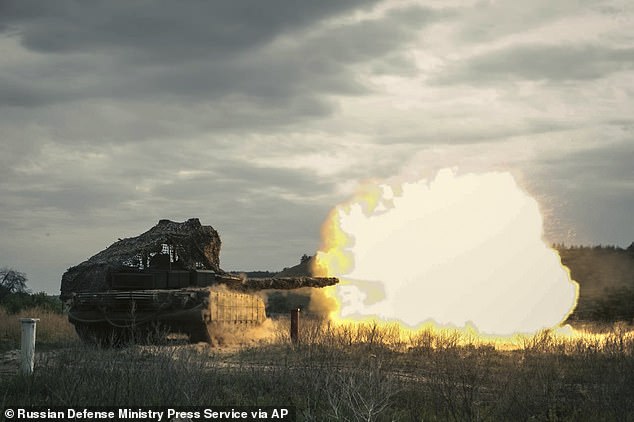
A Russian tank fires during a practice session at an undisclosed location in Ukraine on Friday
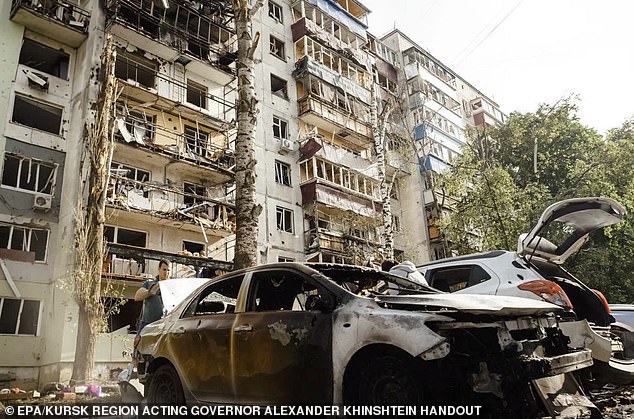
Damaged cars and buildings after a reported Ukrainian strike in Kursk, Russia, on Friday
Mr Zelensky additionally welcomed the ‘principled statement’ and ‘very significant assistance’ of the Nordic-Baltic Eight (NB8) – a regional co-operation group made up of Denmark, Estonia, Finland, Iceland, Latvia, Lithuania, Norway and Sweden.
The NB8 had issued a statement saying Mr Putin ‘cannot be trusted’ and it remained ‘steadfast in our support to Ukraine’, adding that it would ‘continue to strengthen sanctions and wider economic measures to put pressures on Russia’s war economy’.
Diplomatic sources have said Friday’s summit in Alaska paved the way for a deal in which Ukraine would be expected to surrender large swathes of the Donbas region in the east of the country, including areas currently controlled by Kyiv.
In return, President Zelensky would receive ‘Nato-style’ protection from Western countries for what remained of his territory.
He is preparing to fly to Washington for a showdown with Mr Trump, at which he is expected to be told to retreat from the battlegrounds.
Mr Zelensky is understood to have said that he will refuse to surrender Donetsk, which has been at the centre of conflict with Moscow since 2014, but is more broadly ‘open to discussing the issue of territory’.
Last night, Boris Johnson called for Sir Keir to lead international efforts to protect Ukraine from being carved up as a result of what he described as a ‘vomit-inducing’ meeting in Alaska.
Mr Trump has told Mr Zelensky and EU leaders that as part of the negotiations they would have to drop their demands for a ceasefire: it means Putin can continue his attacks on the country until a deal is signed.
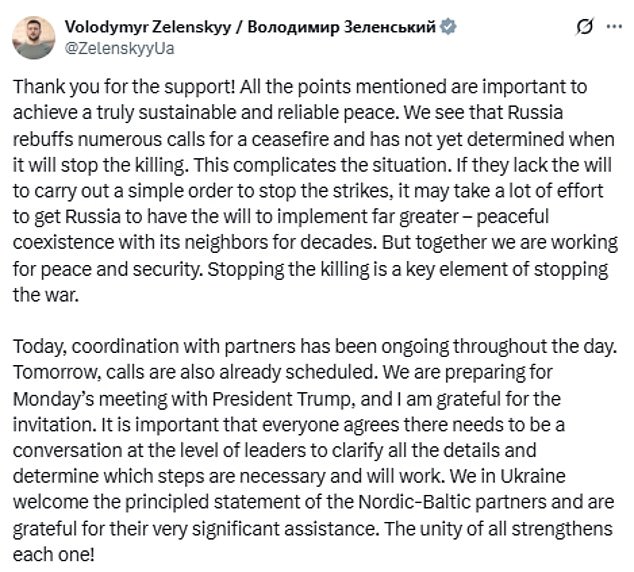
Ukrainian President Volodymyr Zelensky posted the above statement on X last night
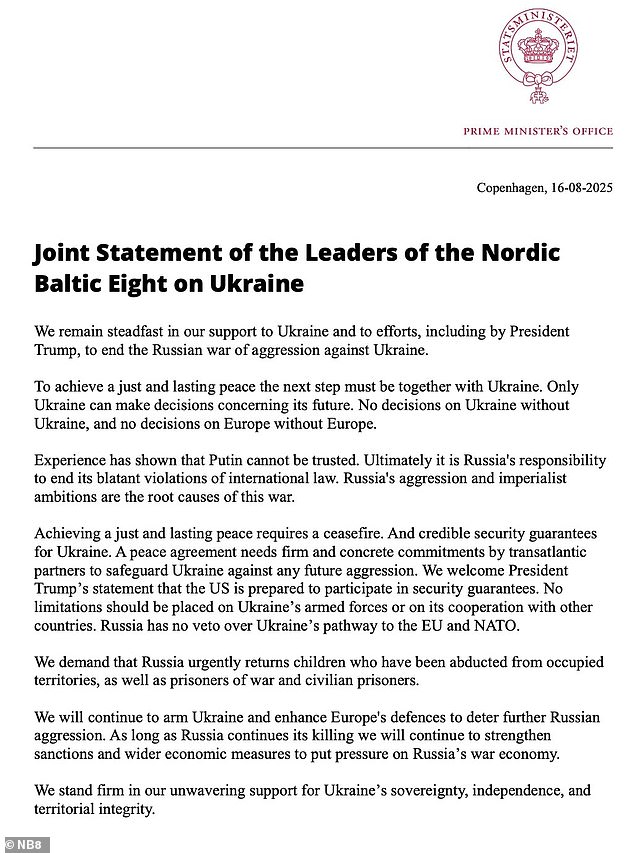
Mr Zelensky reposted this statement by the Nordic-Baltic Eight (NB8) – a regional co-operation group made up of Denmark, Estonia, Finland, Iceland, Latvia, Lithuania, Norway and Sweden
Sir Keir will hold a so-called ‘coalition of the willing’ telephone meeting with Mr Macron and Mr Merz this afternoon to discuss the role of European peacekeepers in a post-conflict Ukraine.
Yesterday, President Trump wrote on his Truth Social platform: ‘The best way to end the horrific war between Russia and Ukraine is to go directly to a Peace Agreement, which would end the war, and not a mere Ceasefire Agreement, which often times do not hold up.
‘President Zelensky will be coming to [Washington] DC, the Oval Office, on Monday afternoon. If all works out, we will then schedule a meeting with President Putin.’
And in an interview with Fox News, Mr Trump signalled that he and Mr Putin had discussed land transfers and security guarantees for Ukraine, and had ‘largely agreed’.
‘I think we’re pretty close to a deal,’ he said, adding: ‘Ukraine has to agree to it. Maybe they’ll say ‘no’.’
Asked what he would advise Mr Zelensky to do, Trump said: ‘Gotta make a deal.’
‘Look, Russia is a very big power, and they’re not,’ he added.
Last night, former British defence minister Tobias Ellwood told The Mail on Sunday that he feared Mr Zelensky was walking into a trap in the White House.
He said: ‘He will be asked to put his head in a vice, with Vladimir Putin pushing from one side and Donald Trump from the other.
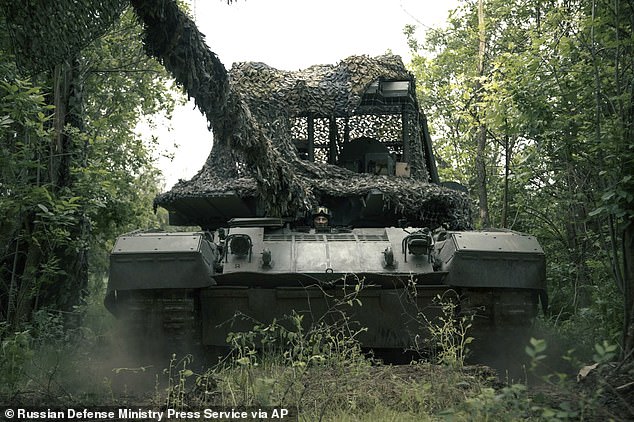
A Russian tank at a practice on a training ground in an undisclosed location in Ukraine on Friday
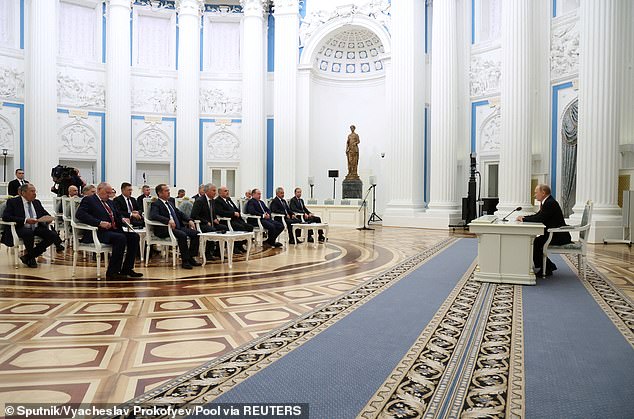
Russia’s President Vladimir Putin addresses senior officials t the Kremlin in Moscow yesterday
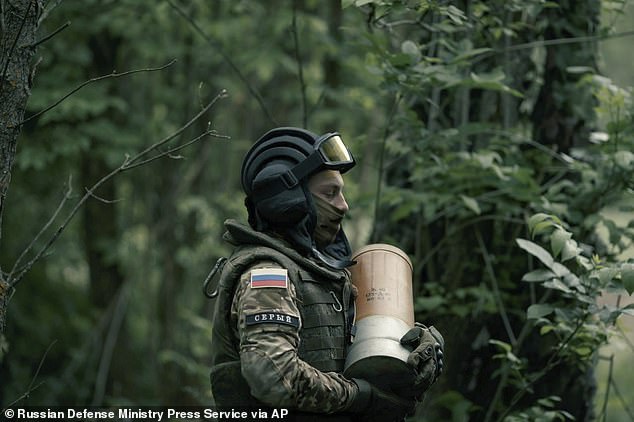
A Russian soldier carries an ammunition during a practice at a location in Ukraine on Friday
‘The Ukrainian president will be presented with a ‘take it or leave it’ deal: surrender territory to Russia or face the blame for wrecking peace.
‘And if Mr Zelensky refuses, Trump will walk away, declaring that America is done with the talks. It’s the classic gangster deal – one you can’t refuse. Except he must.’
Mr Johnson, writing in today’s Mail on Sunday, describes the summit as ‘the most vomit-inducing episode in all the tawdry history of international diplomacy’.
He says: ‘Imagine how it felt to be one of those embattled heroes in a dug-out near Pokrovsk, fighting for your country’s freedom, and to hear the President of the United States – the ex officio team captain of the Free World – refer to Vladimir Putin as ‘the boss’. Retch.
‘Think of the tens of thousands of Ukrainian widows and orphans.
‘Think of the maimed and mutilated; think of the Ukrainian civilians living in daily and nightly terror of Putin’s bombs and missiles still raining down, even though the so-called negotiations were taking place in Alaska.’
But he adds: ‘Like so many of the most objectionable pieces of historic diplomacy, that meeting was also, of course, justifiable and even essential.
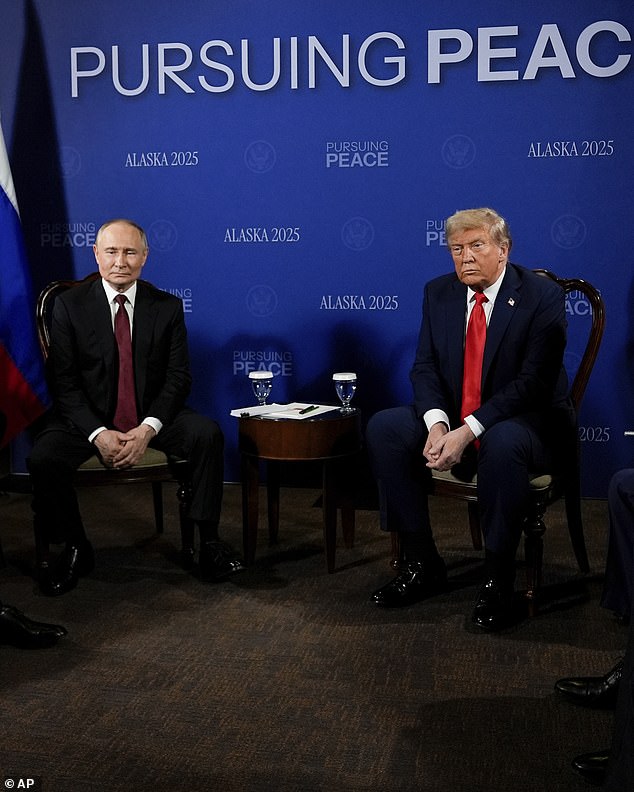
Donald Trump meets Vladimir Putin at Joint Base Elmendorf-Richardson in Alaska on Friday
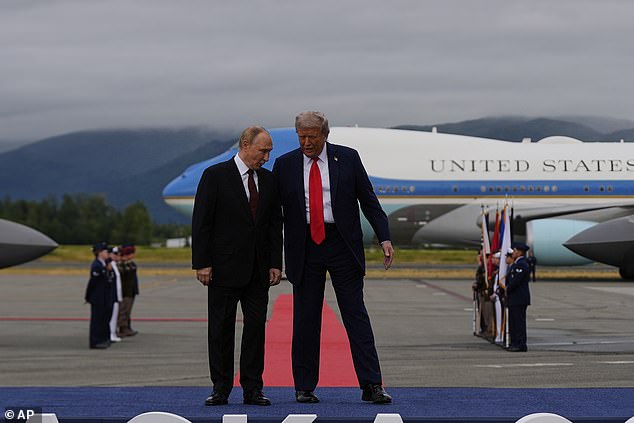
President Donald Trump greets Russia’s President Vladimir Putin in Alaska on Friday
‘Puke-making though it was, Trump was right to try. He was right to meet Putin, because if millions of Ukrainians were watching with horror at the red-carpet rehabilitation of the Russian tyrant, they were also watching with hope…
‘One day this war will end with a peace that protects Ukrainian freedom; but as Trump said in Alaska, the Europeans – led by Britain – will have to step up.’
The proposed deal was greeted with dismay in Ukraine. Volodymyr Dubovyk, a professor of international relations in Odesa, described it as ‘a nothing-burger with a sour aftertaste’.
He said: ‘As a Ukrainian, it was pretty disgusting to see what was going on, all this red carpet, all this clapping and smiles and being chummy.’
Reform UK leader Nigel Farage, a long-time ally of Mr Trump, said of the US President: ‘At least he is trying to find peace.’
But former Tory defence secretary Ben Wallace hit out at the 1980s-style ‘pantomime’ of the summit between the two leaders.
He said: ‘Putin got what he wanted and I think President Trump got a trip to Alaska.’
Russia launched a full-scale invasion of Ukraine in February 2022 and has been gradually advancing for months.
The war – the deadliest in Europe for 80 years – has killed or wounded well over a million people from both sides, including thousands of mostly Ukrainian civilians, according to analysts.